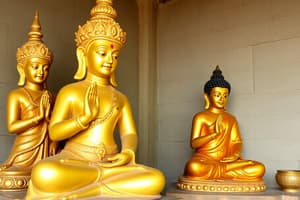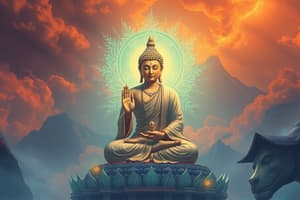Podcast
Questions and Answers
Apa kesamaan utama dalam arsitektur Hindu dan Buddha?
Apa kesamaan utama dalam arsitektur Hindu dan Buddha?
- Keduanya menampilkan ukiran rumit (correct)
- Keduanya membangun kuil dengan bahan-bahan mewah
- Keduanya menggunakan palet warna yang terbatas
- Keduanya menekankan struktur kubah
Apakah ciri khas utama dari seni Hindu?
Apakah ciri khas utama dari seni Hindu?
- Warna-warna yang cerah dan detail yang rumit (correct)
- Garis-garis sederhana dan palet warna yang terbatas
- Struktur kubah dan desain geometris rumit
- Ukiran yang rumit dan tema-tema mitologis
Apa keunikan seni Buddha dalam hal warna dan detail?
Apa keunikan seni Buddha dalam hal warna dan detail?
- Struktur kubah dan desain geometris rumit
- Ukiran yang rumit dan tema-tema mitologis
- Warna-warna yang cerah dan detail yang rumit
- Garis-garis sederhana dan palet warna yang terbatas (correct)
Apa unsur kunci dalam desain arsitektur Buddha?
Apa unsur kunci dalam desain arsitektur Buddha?
Apa fokus utama dalam seni Hindu?
Apa fokus utama dalam seni Hindu?
Apa perbedaan utama antara Hinduisme dan Buddhisme dalam hal festival?
Apa perbedaan utama antara Hinduisme dan Buddhisme dalam hal festival?
Apa yang biasanya terlibat dalam ritual pada festival Hindu dan Buddha?
Apa yang biasanya terlibat dalam ritual pada festival Hindu dan Buddha?
Apa yang menjadi fokus dalam ritual Ullambana dalam Buddhisme?
Apa yang menjadi fokus dalam ritual Ullambana dalam Buddhisme?
Apa yang disebut sebagai sumber pengetahuan ilahi oleh umat Hindu?
Apa yang disebut sebagai sumber pengetahuan ilahi oleh umat Hindu?
Apa yang menjadi tujuan utama ajaran Buddha menurut teks tersebut?
Apa yang menjadi tujuan utama ajaran Buddha menurut teks tersebut?
Study Notes
Hinduism and Buddhism Culture: A Comparison of Art, Architecture, Festivals, and Sacred Scriptures
Introduction
Hinduism and Buddhism are two of the oldest religions in the world, originating from the Indian subcontinent. Both have significantly influenced global cultures through their art, architecture, festivals, and sacred texts. This comparison will explore these aspects of each religion and highlight their similarities and differences.
Art and Architecture
Hinduism
Hinduism's art is characterized by its vibrant colors, intricate detailing, and mythological themes. The most iconic form of Hindu art is sculpture, often depicting deities such as Shiva, Vishnu, Krishna, and Lakshmi alongside stories from Hindu epics like the Ramayana and Mahabharata. Temples are central to Hindu worship and are designed with elaborate carvings and towering spires.
Buddhism
Buddhist art typically features simple lines, a limited color palette, and minimal detail. Unlike Hinduism's emphasis on grandeur, many Buddhist temples were initially constructed with modest materials. However, later temples became more elaborate, reflecting the increasing importance of Buddhism in various societies. Key elements in Buddhist architectural design include stupas (domed structures) and mandalas (intricate geometric designs).
Festivals and Ceremonies
Hinduism
Festivals play a significant role in Hinduism, serving various purposes such as celebrating births, marriages, and deaths, commemorating historical events, and honoring gods and goddesses. Popular Hindu festivals include Diwali (the festival of lights), Holi (the festival of colors), and Navratri (a nine-night celebration dedicated to the goddess Durga). Rituals during these festivals may involve offerings to deities, feasts, and community gatherings.
Buddhism
While not as numerous as Hindu ceremonies, Buddhist rituals are also integral to the faith. These rituals can be divided into three main categories: solitary practice, group practices, and public ceremonies. Some common Buddhist festivals include Wesak (commemorating the Buddha's birthday), Dharma Day (celebrating the first sermon of the Buddha), and Ullambana (an observance focused on liberating deceased relatives from suffering). Ceremonies within Buddhism often involve chanting, meditation, and offering food to monks.
Sacred Texts
Hinduism
Hindus consider several scriptures as authoritative sources of divine knowledge known as Sruti ("what was heard"). These texts include the four Vedas (Rigveda, Samaveda, Yajurveda, Atharavveda), Upanishads, Bhagavad Gita, Puranas, and Agamas. Each text serves a different purpose in Hinduism, covering topics such as religious rites, philosophy, and cosmology.
Buddhism
The canonical literature of Buddhism consists of three primary collections: the Sutras (discourses attributed to the Buddha), Vinaya (rules of conduct), and Abhidharma (philosophy and psychology). Other important scriptures include the Pali Canon, Mahayana Sutras, and Zen literature. Buddhist teachings emphasize moral discipline, mental development, and wisdom, leading to the cessation of suffering.
Conclusion
In summary, while both Hinduism and Buddhism share some characteristics in terms of art, architecture, festivals, and sacred texts, they differ significantly in their approaches to these aspects. Hinduism tends towards elaboration in all areas, whereas Buddhism generally favors simplicity and restraint. Despite these contrasts, both religions have contributed immensely to global civilization through their cultural expressions and philosophical insights.
Studying That Suits You
Use AI to generate personalized quizzes and flashcards to suit your learning preferences.
Description
Pelajari perbandingan seni, arsitektur, festival, dan teks suci antara Hinduisme dan Buddhisme. Temukan persamaan dan perbedaan dalam ekspresi budaya kedua agama kuno ini.




